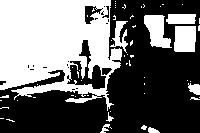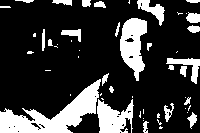
Whitney Hogan ’07, head of Bowdoin’s Peer Health program
In quiet corners around campus this fall, Bowdoin sophomores, juniors and seniors have been having many unusual conversations with first-year students.
While interesting conversations are the norm at a college, these particular discussions are different because they are all solely focused on one subject — the transition to college.
Thirty-two upperclassmen have been trained in motivational interviewing techniques, and each has been assigned to interview 15 to 25 first-year students between mid-October and mid-November. In these sessions, the older advisors encourage the younger students to consider their first weeks at Bowdoin and the decisions they’ve made here so far.
This is the second year Bowdoin’s Peer Health program has conducted peer-to-peer interviews with every first-year student. Three years ago, Bowdoin piloted the program with just one first-year dorm. Since then the College has been expanding the program to encompass the entire class.
“It is Peer Health’s flagship program,” said Matt Friedland ’15, who has been a peer health advisor since his sophomore year. “People know us because of the peer-to-peer interviews.”

Anna Morton ’15
The Peer Health program, made up entirely of volunteer students, offers not just peer-to-peer interviews but also is responsible for planning health-related programming for students throughout the year. Under the guidance of Whitney Hogan ’07, who is Bowdoin’s associate director of health promotion, Peer Health creates events that focus on a range of topics,”from healthy habits and behaviors, to mental health and healthy relationships,” explains peer advisor Anna Morton ’15.
Last year, over 100 students applied for the 32 peer health positions, Hogan said. In the spring, Hogan trained these students in motivational interviewing, a method in which one asks open-ended questions to encourage self-reflection. A motivational interviewer might gently ask students about how they want to change and what might be preventing them from changing. Peer advisors are told not to judge, not to give advice, not to share their own experiences — simply to give first-year students a chance to think about their time at Bowdoin in a new way.

Matt Friedland ’15
“We ask questions that get them to pause and think,” Friedland said. “We give them a chance to do that with a peer, someone who is part of their community.”
While peer-to-peer interviews always address how first-years are navigating Bowdoin’s social scene, parties and alcohol, they also frequently touch on other topics, such as homesickness, academics, sleep, time management, roommates, anxiety, stress, friends and “finding a feeling of belonging,” Hogan said.
“It’s a great way to prevent people from falling through the cracks,” peer advisor Jilian Burk ’16 said.

Jilian Burk ’16
At the end of their conversation, peer advisors hand a resource card to the first-year student with the names and numbers of people they can contact if they are having a problem, such as staff at the health center, counseling center, academic counseling center and in the deans’ office.
While the work of peer health advisors is related to public health and would seem to attract students interested in this field, the job in fact appeals to a range of students with many interests, from theater to English, economics, neuroscience, art history and more.

Tim Coston ’17
All four students interviewed for this article said they were drawn to Peer Health for a number of reasons: they wanted to work with people, to help people, to be part of a community having a positive impact on Bowdoin, to reduce stigmas around mental health.
The peer advisors also have discovered an unexpected side effect from their work. The motivational interviewing technique has come in handy in their regular lives.
Tim Coston ’17 used the questioning style this summer on his family members who were stressed by planning his sister’s upcoming wedding. “There was a lot of tension in my house this summer and I used the motivational interviewing technique to assuage the tensions,” he said.
In what way? “I asked my sister things like, “How do you feel when Mom says this?” he said. The wedding went off perfectly, Coston adds.
